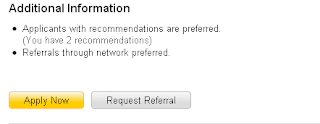 How to Find a Job on LinkedIn, Facebook, Twitter, MySpace and Other Social Networks by Brad and Debra Schepp is a nice basic book on how to use online networking tools to look for work.
How to Find a Job on LinkedIn, Facebook, Twitter, MySpace and Other Social Networks by Brad and Debra Schepp is a nice basic book on how to use online networking tools to look for work.More than one half of the book is devoted to LinkedIn, with the other networking tools receiving one chapter each. The book is filled with testimonials from users who have used that service to find work online, and it also includes advice from users on how to navigate the site and on online networking etiquette, mainly focused on LinkedIn practices.
This book may have nothing new in it for experienced users, but for people who have not joined an online networking service, or have joined but have done nothing more than update their status, this book would offer some direction on how to proceed.
If you haven't used LinkedIn to look for work, you should know that:
- There are librarians on LinkedIn, some looking for work and some that are responsible for hiring
- There are librarian groups on LinkedIn, some offering general support and information, and others that include job boards
- There is a job posting service on LinkedIn that you can use to find work. Some of the job postings will ask that you are have recommendations and can get a referral within your network to apply to a position. Even if you have less than 50 connections, you will probably have at least one third degree connection who you may be able to get put forward by, depending on how your network works.

 If you aren't on LinkedIn, you might want to add it to your job search strategy. You can also consider using LinkedIn to fuel your job club if you are currently at library school or have a local networking group for job seekers.
If you aren't on LinkedIn, you might want to add it to your job search strategy. You can also consider using LinkedIn to fuel your job club if you are currently at library school or have a local networking group for job seekers.How to Find a Job on LinkedIn, Facebook, Twitter, MySpace and Other Social Networks will give you the basics, but you can also sign up for some online education from the LinkedIn Learning Center.